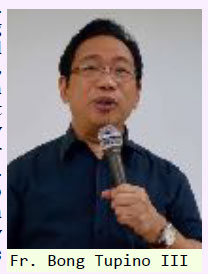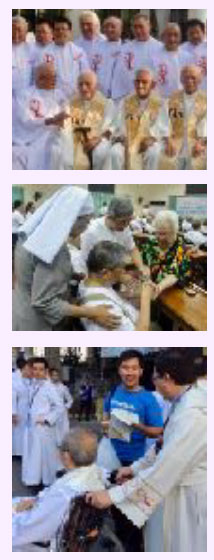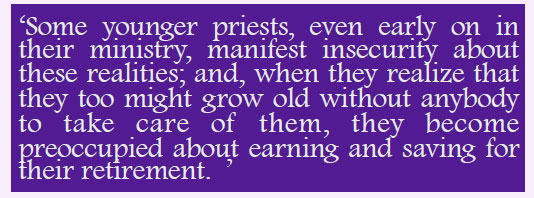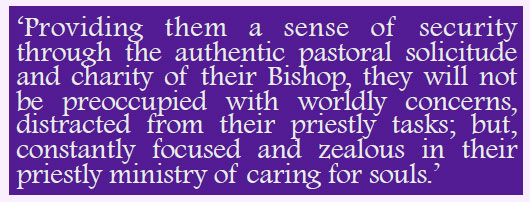Shepherding the Shepherd: Perspective Beyond A Retirement House
 Priests, after their ordination, leave their families and spend their whole life with their parishioners in their parish assignment while they are able. Their parents offer them to God for the service of the church. Instead of the usual course of working and earning money for one’s self and one’s family after graduation, the priest, after ordination, is assigned to a parish community, lives in the parish convent and spends his time for his community and his local church, the diocese, under the supervision and care of his Bishop. His parents do not expect him to support them anymore. In fact, when the priest is in need, the family continues to support him in his projects and activities in the parish.
Priests, after their ordination, leave their families and spend their whole life with their parishioners in their parish assignment while they are able. Their parents offer them to God for the service of the church. Instead of the usual course of working and earning money for one’s self and one’s family after graduation, the priest, after ordination, is assigned to a parish community, lives in the parish convent and spends his time for his community and his local church, the diocese, under the supervision and care of his Bishop. His parents do not expect him to support them anymore. In fact, when the priest is in need, the family continues to support him in his projects and activities in the parish.
Time passes and the priest’s parents grow old, get sick and die. His siblings marry and have their own families to care for. The priest himself grows old and gets sick. Who takes care of him now? Some priests are fortunate if there are still family members or relatives who are able and willing to take them in. Some are cared for by religious nuns whose apostolate is to take care of sick and old priests. Some priests retire in parishes where parish priests are able and willing to take care of them. Some find themselves in old folks homes being looked after by caregivers. And there are those who choose to stay in the house of parishioners or friends who support them.
 After many years of service in the Church some priests retire not really sure of where they would stay and live the rest of their lives. The Bishop, being the head of the local church, the diocese, has the responsibility of taking care of his priests. According to Canon 538, 3, “A parish priest who has completed his seventy fifth year of age is requested to offer his resignation from office to the Diocesan Bishop . . . The diocesan Bishop must make provision for the appropriate maintenance and residence of the priest who has resigned”.
After many years of service in the Church some priests retire not really sure of where they would stay and live the rest of their lives. The Bishop, being the head of the local church, the diocese, has the responsibility of taking care of his priests. According to Canon 538, 3, “A parish priest who has completed his seventy fifth year of age is requested to offer his resignation from office to the Diocesan Bishop . . . The diocesan Bishop must make provision for the appropriate maintenance and residence of the priest who has resigned”.
Faced with these issues, some younger priests, even early on in their ministry, are anxious and insecure that they too might grow old without anybody to take care of them. They then become preoccupied about earning and saving for their retirement. They become conscious of the need to invest in a house or a condominium where they could stay when they would get sick and retire. The Bishop, when he notices this attitude and disposition among his priests, is duty-bound to reach out to them and assuage their insecurities by assuring them that they will be sufficiently taken care of in the future. This is affirmed in the Vatican II document, Bishops in the Church, no. 16, “A Bishop should be solicitious for the welfare — spiritual, intellectual, and material — of his priests so that they may live holy and pious lives, and exercise and a faithful and fruitful ministry.”
Building a retirement house for the elderly and the sick must really be included in his agenda. The Bishop has to have a special concern for the priests. He is to ensure that they are provided with adequate means of livelihood and social welfare, in accordance with the law [Canon 384]. If priests feel that they are taken care of and a decent retirement life is assured then they will be able to focus on their ministry; and, preoccupations on investing, saving for the future will not compete against their pastoral activities and projects.
The Casa de Silencio project of the Diocese of Cubao, I believe, is an essential and relevant undertaking this Year of the Clergy and Consecrated Life by the Bishop of Cubao in cooperation with the priests and religious themselves and collaboration especially with our lay people. It is not only another building project but an attempt to create a culture of authentic pastoral care among the priests and consecrated persons in our local church. Building the Casa de Silencio, hopefully, will not only directly benefit our retirees and sick members of the presbyterium but also for our young clergy to imbibe an attitude and disposition of trust in their Bishop, the Church and God. Providing them a sense of security through the authentic pastoral solicitude and charity of their Bishop, they will not be preoccupied with worldly concerns, distracted from their priestly tasks; but, constantly focused and zealous in their priestly ministry of caring for souls.

The Decree on the Ministry and Life of Priests aptly captures this sense of trust and confidence: “Let priests remember that in carrying out their task they are never alone but are supported by the almighty power of God. Believing in Christ who has called them to share in his priesthood, let them devote themselves to their office with all trust, knowing that God is powerful to increase charity in them. Let them remember too that they have their brothers in the priesthood and indeed the faithful of the entire world, as allies.” (Decree on the Ministry and Life of Priests, no. 22)

